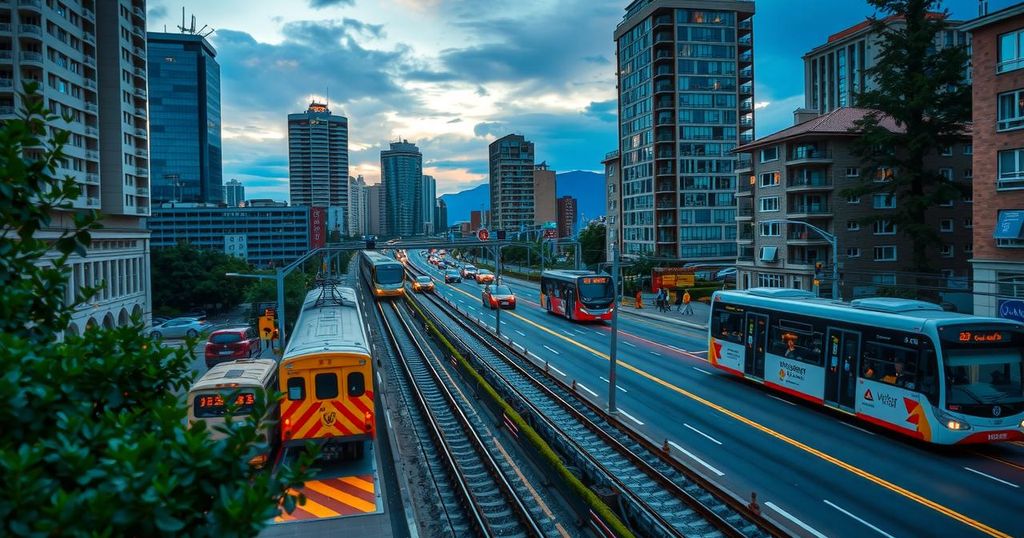Reducing Car Dependence: A $6.2 Trillion Economic Opportunity and a Path to Climate Justice

A recent report from the Union of Concerned Scientists indicates that reducing car dependency in the U.S. could lead to $6.2 trillion in economic savings while advancing climate goals. By achieving a 27% reduction in vehicle miles traveled through improved urban planning and public transit, the U.S. can save lives, reduce health costs, and unlock substantial resources for residents. However, significant challenges remain due to entrenched automotive lobbying and cultural biases favoring vehicle use.
Recent research conducted by the Union of Concerned Scientists highlights that reducing American reliance on automobiles presents not only environmental benefits but also an economic opportunity valued at $6.2 trillion. The report, titled “Freedom to Move,” emphasizes that implementing strong policies to diminish car dependency would significantly contribute to the decarbonization of the transportation sector while enhancing community health and equity. The findings demonstrate that transformative urban planning, including improved investments in walking, biking, and public transit, are essential for achieving critical net-zero milestones in emissions. Specifically, the study suggests that America could achieve a 27 percent reduction in vehicle miles traveled (VMT) by 2050. This reduction would eliminate the need for approximately $201 billion in new energy infrastructure necessary to support the electrification of millions of vehicles. Additionally, the U.S. would save $128 billion in public health costs related to air pollution and could prevent about 250,000 car-related fatalities and 3.7 million injuries by lessening vehicle incidents through reduced driving. The report further estimates that U.S. households could collectively save $5.9 trillion from reduced expenses on auto payments, fuel, and insurance. Lead researcher Kevin Shen stated, “What we find is that reducing VMT and making sure to provide more transit options would be the most equitable way to make these kinds of changes.” However, the report acknowledges the significant challenges posed by entrenched automotive culture and powerful lobbying from the auto and oil industries. In 2023, these industries collectively spent over $118 million to influence legislation, emphasizing the difficulty in shifting away from car culture. A notable concern is that approximately 30 percent of Americans do not drive, and significant portions of the population, particularly communities of color, are disproportionately burdened by transportation costs. Shen asserts, “We titled our report ‘Freedom to Move’ for a reason. Freedom has long been associated with automobiles… But we envision a different kind of future.” This report serves as a crucial call to action for policymakers and society to consider an alternative vision of mobility that goes beyond mere reliance on personal vehicles.
The topic revolves around the shift towards reducing car dependency in the United States as a means for combating climate change while simultaneously unlocking substantial economic savings for individuals and communities. The Union of Concerned Scientists has aimed to provide insights into how modifying existing transportation policies and urban planning can mitigate greenhouse gas emissions and yield a healthier and more equitable society. The underlying premise of the research emphasizes the necessity of diversifying transportation options to alleviate the risks associated with an over-reliance on vehicles, particularly in light of the substantial economic burden that such dependence entails.
In summary, the analysis by the Union of Concerned Scientists underscores that moving towards reduced reliance on automobiles is not solely a matter of environmental necessity but also offers immense economic advantages, amounting to $6.2 trillion in potential savings for American households. Achieving this transition requires persistent policy changes and a collective effort to dismantle the deep-seated car-centric culture. By promoting diverse transportation choices and improving urban infrastructures, America can realize significant public health benefits and pave the way for equitable access to mobility for all citizens.
Original Source: usa.streetsblog.org






